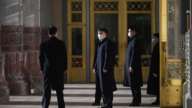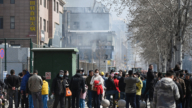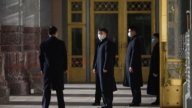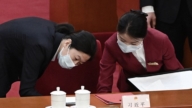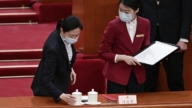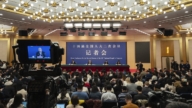【新唐人2014年03月06日訊】中共「兩會」前夕,人民幣暴跌,房產大幅降價。日前,媒體報導地產界大亨潘石屹也湊上熱鬧,緊隨香港富商李嘉誠拋售資產,甚至中共的官員也表示「房地產房價已到達拐點,房地產泡沫破滅呼聲四起。有業內人士說,2014年是房地產開發商的「逃命年」,更有專家驚人預測:大陸一線城市房價將跌80%。
大陸媒體報導,本週二,3月4號,出席政協會議的中共國務院住房城鄉建設部(住建部)副部長齊驥被記者圍堵,在記者追問下,齊驥透露,2014年房地產房價已到達拐點。
北京《國情內參》期刊首席研究員鞏勝利:「我不知道中國住房部的副部長他講的這個問題,他是講的房地產價格是要掉下來,還是中國的房地產依然有錢,還是講中國房地產能夠讓老百姓買得起。」
北京《國情內參》期刊首席研究員鞏勝利表示,不管齊驥這個房地產「拐點」隱含甚麼意思,但是,中國的房地產形勢已經很嚴峻了。
2月25號,人民幣即期匯率發生無預期暴跌,當天下挫282點。 28號,人民幣對美元即期匯率一度暴跌(超過500點),盤中最低觸及6.1808,跌幅達0.86%。人民幣即期匯率從1月13號6.04附近,貶值到6.18,貶值幅度已經超過2%。
《京華時報》3月3號報導,北京2月新房成交量創7年低點,商品住宅均價降5.98%。
曾經一度逼近北京、上海、廣州等一線城市的杭州樓市,打響了馬年樓市降價的「第一槍」。 2月18號,杭州「北海公園」項目宣佈清盤,隨後,多地接連跟進降價,降幅高達數千元。而廣州也出現樓盤打折促銷,價格降到萬元以下。
鞏勝利:「美國QE的實施,現在中國人民幣也在跌的很厲害,28號這一天跌了500點比美元,所以現在中國市場上的錢、房地產從哪裏來錢。」
3月4號,「SOHO中國」公司董事長潘石屹,在公布公司去年(2013年)年報的同時表示,他對當前及未來的地產形勢不樂觀。他認為,中國的房地產土地價格奇高,同時金融的風險跟房地產的風險是緊緊相連,第三方存款、委託理財、信託產品的量越來越大,但對應產品的質量又不很高,這種風險隨時都會爆發。
大陸《證券日報》報導,2月28號,「 SOHO中國」宣佈,將上海的「SOHO海倫廣場」和「SOHO靜安廣場」及權益,全部出售給大陸「金融街控股股份有限公司」,總交易金額為人民幣52億3000萬元。
業內人士表示,「 SOHO中國」41億元的投資成本,加上近三年的資金成本和管理成本等財務費用,僅溢價11億2600萬元,溢價率甚至不足27.4%,低於業界保守預期的30%就將它出售了。這代表潘石屹看淡上海商業地產,緊跟李嘉誠腳步,主動拋售上海資產。
鞏勝利表示,中國經濟規模是靠金融海嘯爆發後,央行濫發4萬億的大投資膨脹起來的。
鞏勝利:「中國經濟的脆弱點就在這裡,它是突然爆發起來的,它膨脹裡麵包括泡沫,所以它的風險要比任何國家可能都要高很多,因為它沒有基礎、也沒有資本的來源。」
鞏勝利還表示,目前房地產的錢來源於中國銀行信託公司的大量投資。而今年,信託公司到期的債券超過10萬億,這10萬億、至少80%都進了房地產。
北京「天則經濟研究所」所長助理段紹譯認為,由於中國目前房子太多,泡沫早已存在,即使人民幣不貶值,房產也要破滅,房價也要跌。
大陸財經評論人士「牛刀」表示,當貨幣泡沫破滅的時候,中國完全依賴貨幣超發拉動的經濟增長已經到頭了。這個過程結束後,中國經濟的本質就展示出來,一線城市房價將會跌去80%。
採訪編輯/易如 後製/鍾元
China’s First-Tier Cities’ Property Price Will Fall By 80 Percent
Before the annual session of China’s National People’s Congress,
Reminbi (RMB) rapidly devalued, and the real
estate price largely dropped.
Recently, media has reported that real estate mogul Pan Shiyi
followed Hong Kong tycoon Li Ka-shine, by selling his assets.
Some officials also said that “the property price is changing
direction, thus reaching an inflection point.
Many people have also spoken of when the
bubble will burst.
Experts have forecast 2014 a year for real estate business people
to be running away from this dire situation.
Some people also speculate that property prices in first-tier cities
in Mainland China will fall by as much as 80 percent.
Chinese media reported that Qi Ji, Deputy Minister of Housing
and Urban-Rural Development, was questioned
by journalists on March 4.
Qi revealed that real estate prices in 2014
has reached a turning point.
Gong Shengli, leading senior researcher of a financial magazine
in China: “I am not sure what the minister’s words meant.
Does it refer to the price of homes falling or the real estate sector
still having money, or does he mean civilians can afford homes?”
Gong Shengli says that it doesn’t matter what Qi’s “inflection
point” meant, the real estate situation has become serious now.
On Feb. 25, RMB spot exchange rate, unexpectedly
dropped down to 282 points.
On Feb. 28, RMB exchange rate to US Dollar had dropped
to over 500 points.
The lowest rate of the day reached 6.1808, which is a
drop of 0.86 percent.
RMB spot exchange rate decreased from 6.04
on Jan. 13 to 6.18, which devaluated more than 2 percent.
On March 3, Beijing Times reported that new homes sold
in February have reached their lowest over the past seven years.
Residential homes are now being reduced by 5.98 percent
of the original price.
Housing prices in Hangzhou, where they were once as high
as first-tier cities such as Beijing, Shanghai and Guangzhou,
has now become the first city to drop its property price in 2014.
On Feb. 18, Beihai Park project in Hangzhou
announced its liquidation.
Many cities followed and dropped its real estate price
by several thousands yuan.
Guangzhou also gives discounts on home purchasing,
the price fell below 10,000 yuan per square meter.
Gong Shengli: “The US Federal Reserves has implemented
a QE ( quantitive easing) monetary policy.
Now RMB has dropped rapidly.
On Feb. 28, RMB dropped 500 points to the US Dollar.
So in China’s market, where does the real estate money come from?”
On March 4, Pan Shiyi, Chairman of commercial real estate
developer at SOHO China,
announced its 2013 annual company report.
He said that he was not very optimistic for the future prospects
of China’s property development market.
The land costs are out priced too high, bringing with it
greater financial risks to the real estate world.
The third party’s deposits, or trust management funds
are expanding.
Yet the quality of the product isn’t very high,
and the result is sure to be an eruption at any time.
Securities Daily reported that SOHO China announced
on Feb. 28,
they will sell SOHO Shanghai Square and
SOHO Jingan Square to the Financial Street Holding.
The total amount of sales will be 5.23 billion yuan (US$853 million)
Experts say that SOHO China have spent a total investment of
4.1 billion yuan (US$669 million).
Apart from the extra cost of management in the past three years,
it can only get 1.13 billion yuan premium in return.
The premium rate is less than 27.4 percent, lower than the industry’s
conservative expectations of 30 percent.
This shows us that Pan Shiyi has lost full confidence in
Shanghai real estate business,
as now he follows what Li Ka-shing does, actively selling
Shanghai’s assets.
Gong Shengli says that the scale of the Chinese economy has
expanded since the recessions occurred,
back then the Central Bank injected 4 trillion yuan (US$570 billiion)
in to the system.
Gong Shengli: “China’s economy weak point is just like this,
it suddenly injects funds, expanding everything in its wake,
including the ever growing bubble.
Thus the risks are much higher than that of any other country.
Because it has neither foundation, nor capital sources.”
Gong Shenglin says that the current funds of real estate came
from the trust company of Bank of China’s large investment.
This year, maturing of trust bonds is more than 10 trillion yuan,
At least 80 percent of the money went into real estate.
Duan Shaoyi, Assistant Director of Beijing Unirule Institute
of Economics, suggests that because there are so many
houses in China, the bubbles already exists.
Although RMB doesn’t devalue, the housing bubbles
will burst, the price will fall.
Niu Dao (chopper), financial commentator says that
when the monetary bubble bursts,
the money that China completely depends upon to stimulate
the economic growth, will have come to a close.
Once it comes to the end of its life expectancy,
China’s true economy will show itself,
The first-tier cities’ home price will fall by
a massive 80 percent.
Interview & Edit/Yiru Post-Production/Zhoutian


